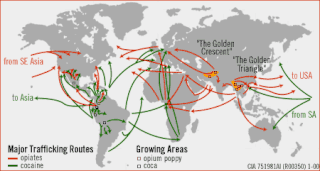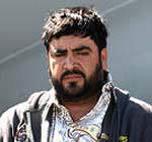
Osiel Cárdenas Guillén is a Mexican drug lord and the former leader of the Gulf Cartel and Los Zetas. Originally a mechanic in Matamoros, Tamaulipas, he entered the cartel by killing Juan García Abrego's friend and contender Salvador Gómez, after the former's arrest in 1996. As confrontations with rival groups heated up, Osiel Cárdenas sought and recruited over 30 deserters from the Grupo Aeromóvil de Fuerzas Especiales to form the cartel's armed wing. Los Zetas served as the hired private mercenary army of the Gulf Cartel.

The illegal drug trade or drug trafficking is a global black market dedicated to the cultivation, manufacture, distribution and sale of drugs that are subject to drug prohibition laws. Most jurisdictions prohibit trade, except under license, of many types of drugs through the use of drug prohibition laws.

Ismael "El Mayo" Zambada García, is a Mexican suspected drug lord and leader of the Sinaloa Cartel, a criminal group based in Sinaloa. Before assuming leadership of the entire cartel, he served as the logistical coordinator for the Zambada-García faction of the Sinaloa Cartel which has assisted in the exporting of cocaine and heroin into Chicago and other US cities by train, ship, jet, and narco-submarines.

Los Zetas is a Mexican criminal syndicate, regarded as the most dangerous of the country's drug cartels. While primarily concerned with drug trafficking, the organization also runs profitable sex trafficking and gun running rackets. The origins of Los Zetas date back to the late 1990s, when commandos of the Mexican Army deserted their ranks and began working as the enforcement arm of the Gulf Cartel. In February 2010, Los Zetas broke away and formed their own criminal organization, rivalling the Gulf Cartel.
Red Ribbon Week is an alcohol, tobacco, and other drug and violence prevention awareness campaign observed annually in October in the United States. It began as a tribute to fallen DEA special agent Enrique Camerena in 1985. According to the United States DEA, Red Ribbon Week is the nations largest and longest-running drug awareness and prevention program.

The Gulf Cartel is a criminal syndicate and drug trafficking organization in Mexico, and perhaps one of the oldest organized crime groups in the country. It is currently based in Matamoros, Tamaulipas, directly across the U.S. border from Brownsville, Texas.
Jesús Hector Gutiérrez Rebollo was a Mexican military general who was sentenced to 40 years in prison on multiple charges, including involvement in organized crime in the late nineties.

Joaquín Archivaldo Guzmán Loera is a Mexican drug lord and former leader of the Sinaloa Cartel, an international crime syndicate. Known as "El Chapo" because of his 168 cm stature, Guzmán is considered to have been the most powerful drug trafficker in the world.
The Mexican Drug War is an ongoing asymmetric low-intensity conflict between the Mexican government and various drug trafficking syndicates. In 2006 when the Mexican military began to intervene, the government's principal goal was to reduce drug-related violence. The Mexican government has asserted that their primary focus is on dismantling the powerful drug cartels, rather than on preventing drug trafficking and demand, which is left to U.S. functionaries.

Juan García Ábrego is a Mexican former drug lord who started out his criminal career under the tutelage of his uncle Juan Nepomuceno Guerra, who is reported to be the former head of a criminal dynasty along the Mexico–United States border now called the Gulf Cartel.
The Sinaloa Cartel, also known as the Guzmán-Loera Organization, the Pacific Cartel, the Federation and the Blood Alliance, is an international drug trafficking, money laundering, and organized crime syndicate established during the late 1980s. The cartel is primarily based in the city of Culiacán, Sinaloa, with operations in the Mexican states of Baja California, Durango, Sonora, and Chihuahua. The 'Federation' was partially splintered when the Beltrán-Leyva brothers broke apart from the Sinaloa Cartel.
Edgar Valdez Villarreal, also known as La Barbie, is a Mexican-American drug lord and a lieutenant of the Beltrán Leyva Cartel, a criminal group based in Sinaloa.

A narco-submarine is a type of custom-made ocean-going self-propelled submersible vessel built by drug traffickers to smuggle drugs. They are especially known to be used by Colombian drug cartel members to export cocaine from Colombia to Mexico, which is often then transported overland to the United States.
The timeline of some of the most relevant events in the Mexican Drug War is set out below. Although violence between drug cartels had been occurring for three decades, the Mexican government held a generally passive stance regarding cartel violence through the 1980s and early 2000s.

Alberto Espinoza Barrón is a former Mexican drug trafficker and lieutenant of the La Familia Michoacana drug cartel.
The Beltrán Leyva Cartel is a Mexican drug cartel and organized crime syndicate, formerly headed by the five Beltrán Leyva brothers: Marcos Arturo, Carlos, Alfredo, Mario Alberto and Héctor. Founded as a branch of the Sinaloa Cartel, the Beltrán Leyva cartel was responsible for transportation and wholesaling of cocaine, heroin and marijuana. It controlled numerous drug trafficking corridors, and engaged in human smuggling, money laundering, extortion, kidnapping, murder and gun-running.
Marcos Arturo Beltrán Leyva was an organized crime figure and the leader of the Mexican drug trafficking organization known as the Beltrán-Leyva Cartel, which is headed by the Beltrán Leyva brothers: Marcos Arturo, Carlos, Alfredo and Héctor. The cartel is responsible for cocaine, marijuana, heroin and methamphetamine production, transportation and wholesaling. It controls numerous drug trafficking corridors into the United States and is responsible for human smuggling, money laundering, extortion, kidnapping, murder, contract killing, torture, gun-running and other acts of violence against men, women, and children in Mexico. The organization is connected with the assassinations of numerous Mexican law enforcement officials.

Rafael Cedeño Hernández is an imprisoned Mexican drug trafficker who was a high-level leader of La Familia Michoacana, a drug cartel based in the Mexican state of Michoacán. He was the successor of Alberto Espinoza Barrón, a drug trafficker who was arrested on 31 December 2008 by the Mexican authorities.

Alfredo Beltrán Leyva, commonly referred to by his alias El Mochomo, is a convicted Mexican drug lord and former leader of the Beltrán-Leyva Cartel, a drug trafficking organization. He was one of Mexico's most-wanted drug lords. Beltrán Leyva was responsible for smuggling multi-ton shipments of cocaine and methamphetamine to the United States from Mexico and South America between the 1990s and 2000s. He worked alongside his brothers Héctor, Carlos, and Arturo.












